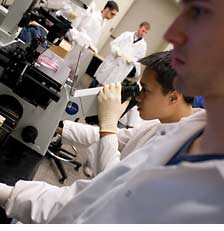
As we emerge from an era of great innovation and discovery that has produced tremendous advances in communications, medicine, and information technology, we look at new sets of needs and problems facing the world-grand challenges of the 21st century.
The plan points the way for advancing Lehigh's intellectual footprint with cross-disciplinary research activity spanning the colleges and bringing the necessary expertise to bear on three grand challenge areas:
- Globalization— Globalization has become a powerful force arising from high-speed communications and transportation networks that have lowered barriers to the exchange of people, goods, and ideas around the world. At the same time, the emergence of robust economic and ideological competition has made globalization more challenging than benign. Globalization may be the defining characteristic of the early 21st century, and it provides a new lens for our views of topics like commerce, resource distribution, arts and aesthetics, intercultural relations, academic and literary discourse, and relationships among nations.
- Energy, Environment and Infrastructure—The worldwide demand for energy and our ability to alter the environment mean that, in effect, we must manage the planet's resources and viability. One of the most vexing sets of challenges facing modern society is how we will succeed in this management. Issues related to energy supply, delivery, economies, and consumption are more visible and crucial than ever. These issues also have serious national security implications. Lehigh is positioned to address the challenges in energy and environment in areas that are linked to fundamental needs in national infrastructure.
- Health—Lehigh has research programs that contribute to the understanding of health and disease, disabling conditions, public health, the healthcare industry, and healthcare delivery; artistic, literary, and historical studies of the human condition; diagnosis, prevention, and treatment of disease and disabling conditions; and health and disability education. Some of Lehigh's strength in this area comes through faculty interest in applying their disciplinary expertise to diverse health needs and problems.
These challenges are important to society, and they represent areas where Lehigh has core strengths and where concerted effort will allow Lehigh to have a significant impact. Both basic and applied research contributes to Lehigh's capacity to address grand challenges. Lehigh's structure, culture, and core strengths are ideally suited to this venture.
One of Lehigh's great attributes is its translation of fundamental understanding and discoveries into practical use for the benefit of society. In many other cases, Lehigh's faculty, staff, and students have worked to make the world a better place, and Lehigh is noted for bringing concepts from theory to practice.
The hallmark of research universities is their marriage of forefront research with high-quality teaching. Professors who are leaders in their fields bring the latest knowledge and newest discoveries to their students in classrooms, laboratories, workshops, and the field. Lehigh's research strengths also build our external visibility and reputation through collaborative projects and the dissemination of research results.
Students learn fundamentals and solve problems in structured curricula and open-ended research projects that require creativity. The pursuit of new knowledge and the creative discovery process of research and scholarly inquiry establish an intellectual culture that pervades the university.
The areas of focus in this plan are intended to frame the trajectory of Lehigh's research expansion, and they are synergistic and interconnected as illustrated in the accompanying diagrams.
View the complete plan on the Transforming Lehigh site (PDF) >
